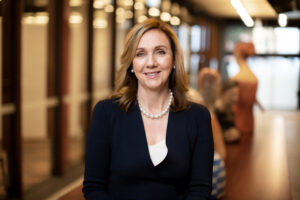by Content Café, 24 September 2021
Each month we hear from industry insiders in Australia and abroad to get their take on content piracy. Is content protection improving? How do we stop piracy? How does Australia compare to the rest of the world? These are some of the questions we'll be exploring with leaders across the content industry.

Bridget Fair joined Free TV Australia as Chief Executive Officer in February 2018, having previously held a number of senior roles with Seven West Media responsible for corporate affairs, government relations and business strategy. She has also worked with the ABC and SBS, and in private legal practice.
Bridget is a board member of the Judith Neilson Institute for Journalism & Ideas, a Member of the Ministerial Advisory Council on Trade and an independent non-executive Director of iSelect.
Bridget is a former Chairman of Screenrights and has previously served as a Director of OzTAM and Freeview
I am the CEO of Free TV Australia, the peak industry body representing commercial television broadcasters. I joined in 2018, after many years in senior roles at Seven West Media.
Free TV is dedicated to supporting and advancing the important contribution commercial television makes to Australia’s culture and economy. Our members create jobs, provide trusted local news, tell Australian stories, bring us together with live and free sport, create shared entertainment experiences and nurture Australian talent. The industry invests more than $1.5 billion in Australian content each year. In doing so, it has supported our local television production industry.
Commercial television broadcasters provide Australians with access to a vast library of content. In almost every market, 18 channels are available 24/7, broadcasting news and drama, light entertainment and sport, including more than 100,000 hours of Australian content. It is available readily and reliably at the push of a button to 97% of Australians.
Piracy is a major challenge for Free TV broadcasters. We make and commission great content, which we broadcast on our linear channels and make available on our BVOD services. BVOD is Australia’s fastest growing media platform, with revenue growth of 78.4% for the six months to 30 June 2021. While the content on both our linear and BVOD platforms is free, our business depends on the number of people who watch it, which in turn generates advertising revenue. If pirates are making our content available in other ways, it stands to reason that less people will watch the content we have so heavily invested in on our platforms. It’s a significant threat to our business model and therefore to the whole production and distribution sector.
The biggest challenge is keeping up with the pirates. No sooner has one pirate site or channel been identified and dealt with then another one pops up. In fact, I have a real objection to the term “pirate”, which gives these well-funded, professional and often organised crime- linked enterprises a larrikin, swashbuckling character. That’s another challenge, educating consumers to understand that this is theft, and that it undermines the ability of many of their cultural heroes to make a living from their work. Creative Content Australia has a great track record in trying to ensure that Australians understand that this is not a victimless crime and that it has real implications for our content creators.
Australia has strong copyright laws and the introduction of site blocking laws in recent years has been extremely important in reducing content theft. We have to be very careful to resist calls to water down our intellectual property laws to make it easier for people to use creative content without payment or permission. I think the work done by Creative Content Australia and a strong coalition of content producers and distributors has played a key role in generating understanding and support in Canberra for these important laws. But legal action is only part of the solution. The co-operation of global digital platforms is essential in identifying material that is in breach of copyright and taking swift practical action without waiting for lengthy court actions to play out. If someone is pirating a live sporting event, for example, the main value is in the live experience. Tracking down those responsible after the event doesn’t really solve the problem.
I am still recovering from my Olympics overdose, which was a huge help in lifting the mid-lockdown blues. My kids and I were keen fans of The Voice and Lego Masters earlier this year. I love Aussie drama and Five Bedrooms and RFDS are outstanding, and if you missed Informer 3838 you should definitely binge it on Nine Now. I’m a sneaky fan of The Block and the political junkie in me sees me regularly catching Insiders on a Sunday. And my latest guilty pleasure has been watching Ted Lasso, the kind of heart-warming, feel-good show we need right now.
While the media sector is changing rapidly, Australians still value their Free TV services. TV is moving rapidly from the broadcast age into a hybrid world, where people want to access their favourite television experiences across multiple technology platforms. I’m excited to be a part of taking television into this next stage. But we know that Australians will still heavily rely on broadcast channels for many years to come, so there are some really challenging questions that need to be addressed around future spectrum use and transmission technology. We also need to get the right regulatory settings to ensure we continue to have the strong and viable free, ubiquitous television services that bring us together as a nation. That means looking at issues like prominence. Connected TVs are positioning manufacturers and operating systems as the gateway to television content, so we need to make sure people can still find their Free TV content easily when they turn on the television.
Before you go, check out last month’s interviews with Liz Bales, Chief Executive of The Industry Trust for IP Awareness and Scott Lorson, CEO of Fetch TV